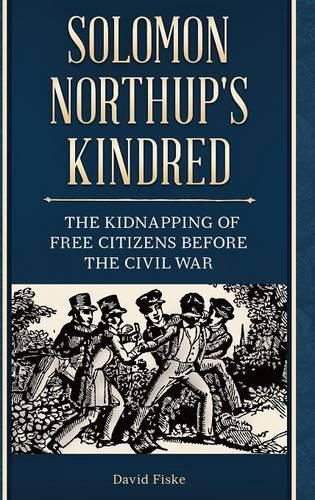Readings Newsletter
Become a Readings Member to make your shopping experience even easier.
Sign in or sign up for free!
You’re not far away from qualifying for FREE standard shipping within Australia
You’ve qualified for FREE standard shipping within Australia
The cart is loading…






Kidnapping was a lucrative crime in antebellum America, and many American citizens-especially free blacks-were abducted for profit. This book reveals the untold stories of the captured.
The story of Solomon Northup, subject of the Academy Award-winning best picture 12 Years a Slave, is representative of the deplorable treatment many African Americans experienced in the period leading up to the Civil War. This book examines antebellum kidnapping, delving into why and how it occurred, and illustrating the active role the U.S. government played in allowing it to continue. It presents case studies of dozens of victims’ experiences that illustrate a grim and little-remembered chapter in American history.
David Fiske’s Solomon Northup’s Kindred reveals the abhorrent conditions and greed that resulted in the kidnapping of American citizens. Factors like early fugitive slave laws, the invention of the cotton gin, the 1808 ban on importing slaves into the United States, and the Supreme Court’s Dred Scott decision made these crimes highly profitable. Fiske sheds much-needed light on the practice of kidnapping, explaining how it was carried out, identifying conditions that allowed kidnappers to operate, and describing methods for combating the crime. He offers dozens of case studies along with documentation from across historical newspaper reports, anti-slavery literature, local history books, and academic publications to provide an accurate account of kidnapping crimes of the time.
Features portraits, sketches, and images of documents and newspaper articles related to kidnapping
Identifies the numerous factors that led to the lucrative business of kidnapping
Describes the physical and psychological subduing of victims
Includes the perspectives of those who tried to help: educators, crusaders, rescuers, and cooperative slave owners
$9.00 standard shipping within Australia
FREE standard shipping within Australia for orders over $100.00
Express & International shipping calculated at checkout
Kidnapping was a lucrative crime in antebellum America, and many American citizens-especially free blacks-were abducted for profit. This book reveals the untold stories of the captured.
The story of Solomon Northup, subject of the Academy Award-winning best picture 12 Years a Slave, is representative of the deplorable treatment many African Americans experienced in the period leading up to the Civil War. This book examines antebellum kidnapping, delving into why and how it occurred, and illustrating the active role the U.S. government played in allowing it to continue. It presents case studies of dozens of victims’ experiences that illustrate a grim and little-remembered chapter in American history.
David Fiske’s Solomon Northup’s Kindred reveals the abhorrent conditions and greed that resulted in the kidnapping of American citizens. Factors like early fugitive slave laws, the invention of the cotton gin, the 1808 ban on importing slaves into the United States, and the Supreme Court’s Dred Scott decision made these crimes highly profitable. Fiske sheds much-needed light on the practice of kidnapping, explaining how it was carried out, identifying conditions that allowed kidnappers to operate, and describing methods for combating the crime. He offers dozens of case studies along with documentation from across historical newspaper reports, anti-slavery literature, local history books, and academic publications to provide an accurate account of kidnapping crimes of the time.
Features portraits, sketches, and images of documents and newspaper articles related to kidnapping
Identifies the numerous factors that led to the lucrative business of kidnapping
Describes the physical and psychological subduing of victims
Includes the perspectives of those who tried to help: educators, crusaders, rescuers, and cooperative slave owners